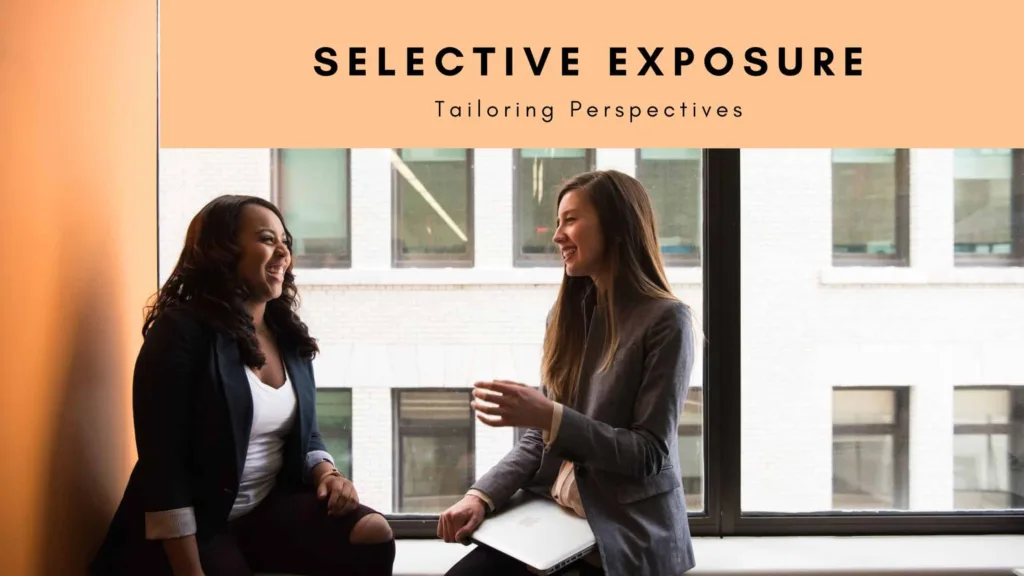Selective Exposure is when people prefer to listen to things that match what they already think and ignore stuff that disagrees with them. It shapes how people see the world, make choices, and talk to each other. It’s like sticking to what you already believe and not paying much attention to other ideas.
Psychological Background
- Confirmation Bias: When you already think something is true, you like to hear information that agrees with you. It feels good and makes you more sure about what you believe. Imagine you love a particular superhero. You might look for news or stories that say how great that superhero is and ignore anything that says otherwise.
- Cognitive Dissonance: If you hear something that goes against what you believe, it makes you feel uncomfortable. To feel better, you might avoid listening to things that challenge your ideas. Let’s say you believe eating sweets is bad, but you love chocolate. If someone tells you chocolate is healthy, it might make you feel uneasy. To avoid that feeling, you might ignore such information.
- Filter Bubbles: Online, computers try to show you things you like. They create a bubble around you, showing only what you prefer. This can make it hard to see different ideas. If you often watch funny cat videos on a website, it might start showing you more and more cat videos. Soon, you only see cats, and you might forget there are many other kinds of animals or videos out there

Social and Political Implications
Social Side:
- People Sticking Together: If everyone only likes the same things, it’s like having clubs where everyone does the same activities. It can be hard for different groups to be friends. Think of it like some friends only wanting to play one game. If you don’t like that game, it might be tricky to play together.
- Missing Different Ideas: If we only hear what we already know, it’s like listening to one song all the time. We might not discover other great songs. Imagine if you only knew part of a story. It’s like reading a book but not getting to the exciting parts.
Related Article: Selective Attention: Filtering the Noise
Political Side:
- Voting without Knowing Everything: When people only listen to news that agrees with their team, they might vote without knowing all the details. It’s like picking a favorite player without knowing the game well. Think of it like picking the best game player, but you only know a little about them. You might miss someone even better.
- Arguments Instead of Solutions: If everyone only talks about things they already like, it can lead to arguments. It’s like playing a game, but everyone wants to play by their own rules. If friends only want to play one type of game and don’t listen to others, it can be hard to agree on how to play together.
How to Cope with Selective Exposure
- Understand Information: Learn how to tell if something is true or just someone’s opinion. Take a short course or read about checking facts online.
- Explore Different Sources: Try to get information from different places, not just the ones you always use. It helps you see different sides of a story.
- Talk to Different People: Have conversations with people who think differently. Share your ideas and listen to theirs. It helps you understand each other better.
- Think for Yourself: Question what you hear or read. Don’t believe everything right away. Be open to changing your mind if you learn something new.
- Mix Up Social Media: Follow different people on social media, not just those who agree with you. It makes your feed more interesting and gives you different perspectives.
- Find Neutral Information: Look for news that tells you facts without taking sides. It helps you form opinions based on real information, not just one point of view.
Conclusion: Our brains often like to listen to things that match what we already think. This can change the way we look at the world. Knowing about this is important for making our society more open-minded and smart. We can do this by making sure we hear different opinions, learning how to check if information is true, and having open talks with others. That way, we can reduce the not-so-good effects of only paying attention to one type of information and make sure we understand things better.

Pingback: Imaginary Audience Psychology: All Eyes On You
Pingback: Red Herring Fallacy: Distracting from the point